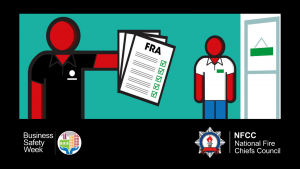Recently added item(s)
You have no items in your basket.

This week is Business Safety Week* (5th - 11th September) and an opportunity for fire industry professionals to talk to their customers about complying with fire safety law and reducing their risk of fire.
It’s probably not a question that many businesses really want to consider but it is absolutely essential to do so. Would their insurance company pay out in the event of a fire?
It is unfortunate, but not uncommon, for businesses to be completely obliterated by a single fire. According to statistics provided by insurance companies, of those businesses that are hit, around 80% cease trading within as little as 18 months. With that in mind, it makes sense for a business to do everything it can to prevent disaster striking.
Who is responsible for fire safety?
Employers, building owners, landlords, occupiers, or anyone else with control of a premises - such as a facilities or building manager or a managing agent is responsible for fire safety in a business or other non- domestic premises. So as a fire industry professional, what steps should you encourage them to take in order to protect not just the lives of their employees, but their building, its contents, and their insurance cover too?
The Fire Industry Association (FIA) recommends a robust fire risk assessment, carried out by a competent individual, to ensure that all parts of the building have been accounted for and the risks have been considered and planned for. The risk assessment will highlight not only what fire protection equipment is needed but also where.
Fire extinguishers
Fire Alarm System
If asked, we always recommend that quality fire safety equipment is installed by a BAFE qualified engineer, and that Responsible Persons get help and advice. This is especially important when you consider that ultimate responsibility for the competency and engineering skills of the installer or service provider is on the owner of the fire system - and there is nothing to prevent unqualified and inexperienced organisations from operating in the fire industry.
Getting insured
It might appear to be a straightforward process to simply go to an insurance broker and get your business insured. Certainly, having adequate fire protection equipment installed and maintained by a competent fire industry professional will reduce the risk of fire causing damage to the business. However, the fire protection equipment chosen may have an effect on the insurance cover. Insurance companies vary greatly with their criteria, and some may refuse to insure a company, or it may even be difficult to insure a business that does not have adequate fire protection under certain circumstances.
For insurance purposes, how the building is constructed and divided up and the measures in place to stop or slow the spread of fire will also be a key factor. You may be unsure about the construction of the building and what measures are in place for fire protection, such as in-built dry risers for example. In this case this information will need to be obtained, probably from the construction company or building owner. If the building does have in-built dry risers, it’s also worth noting that according to the Fire Service up to 60% of these have never been tested but since these are also the responsibility of the Responsible Person, they can certainly invalidate insurance if they are not being maintained.
You can read more about fire risk assessments in our recent blog Fire Risk Assessments – what’s the point? - Fire Depot
*Business Safety Week is an annual event organised by the National Fire Chiefs Council (NFCC) and supported by Fire and Rescue Services. Its aim is to make small and medium sized businesses aware of their legal and moral fire safety responsibilities in the workplace.
Fire Depot has been the UK's favourite fire safety supplier for over 50 years, we know the fire protection and prevention business inside out. Our experienced team can offer advice and guidance about any of our fire safety products. For expert help and advice, please contact the Fire Depot team on 0330 999 2233, email us at sales@firedepot.co.uk or visit https://www.firedepot.co.uk/ to see our full range of fire safety products.
The information contained within this blog is provided solely for general informational and educational purposes and is not intended as a substitute for professional advice. Before taking any actions based upon this information, we advise the reader to consult any and all relevant statutory or regulatory guidance and where felt necessary to consult a qualified fire or industry regulation professional. The use or reliance on any information contained herein is solely at the reader’s risk.